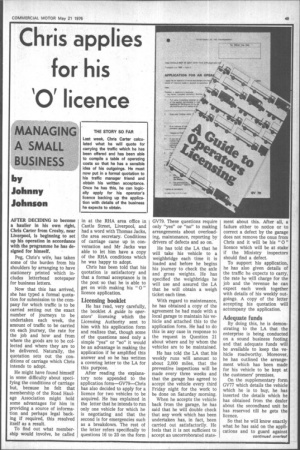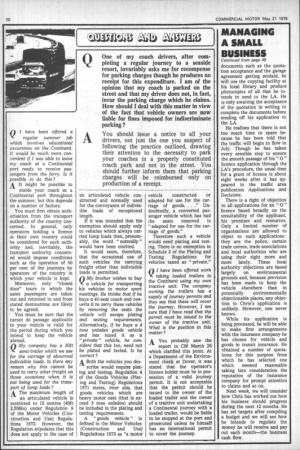Chris applies for his 0' licence
Page 53

Page 54

If you've noticed an error in this article please click here to report it so we can fix it.
MANAGING A SMALL BUSINESS
by Johnny Johnson
AFTER DECIDING to become a haulier in his own right, Chris Carter from Crosby, near Liverpool, is beginning to set up his operation in accordance with the programme he has designed for himself.
Peg, Chris's wife, has taken some of the burden from his shoulders by arranging to have stationery printed which includes letterhead notepaper for business letters.
Now that this has arrived, she has typed a formal quotation for submission to the company for which traffic is to be carried setting out the exact number of journeys to be undertaken each week, the amount of traffic to be carried on each journey, the rate for the job and how and from where the goods are to be collected and where they are to be delivered. Naturally, the quotation sets out the conditions of carriage which Chris intends to adopt.
He might have found himself in some difficulty about specifying the conditions of carriage but, because he felt that membership of the Road Haulage Association might hold some advantages for him in providing a source of information and perhaps legal backing if required, this resolved itself as a result, To find out what membership would involve, he called in at the RHA area office in Castle Street, Liverpool, and had a word with Thomas Jacks, the area secretary. Conditions of carriage came up in conversation and Mr Jacks was able to let him have a copy of the RHA conditions which he was happy to adopt.
Chris has been told that his quotation is satisfactory and that a formal acceptance is in the post so that he is able to get on with making his " 0 " licence application.
Licensing booklet
He has read, very carefully, the booklet A guide to operators' licensing which the Licensing Authority sent to him with his application form and realises that, though some of the questions need only a simple "yes" or "no" it would be an advantage in making the application if he amplified this answer and so he has written a covering letter to the LA for this purpose.
After reading the explanatory note appended to the application form—GV79—Chris has also decided to apply for a licence for two vehicles to be acquired. He has explained in the letter that he intends to run only one vehicle for which he is negotiating and that the second is for emergencies such as a breakdown. The rest of the letter refers specifically to questions 16 to 23 on the form GV79. These questions require only "yes" or "no" to making arrangements about overloading, maintenance, reporting by drivers of defects and so on.
He has told the LA that he will take his vehicle to a weighbridge each time it is loaded and before he begins his journey to check the axle and gross weights. He has specified the weighbridge he will use and assured the LA that he will obtain a weigh ticket each time.
With regard to maintenance, he has obtained a copy of the agreement he had made with a local garage to maintain his vehicle and attached this to the application form. He had to do this in any case in response to the request in Question 21 about where and by whom the vehicles are to be maintained.
He has told the LA that his weekly runs will amount to about 2,000 miles, that the preventive inspections will be made every three weeks and that the garage has agreed to accept the vehicle every third Friday night for the work to be done on Saturday morning.
When he accepts the vehicle back from the garage, he has said that he will double check that any work which has been undertaken has, in fact, been carried out satisfactorily. He feels that it is not sufficient to accept an uncorroborated state ment about this. After all, a failure either to notice or to correct a defect by the garage does not remove the onus from Chris and it will be his "0 " licence which will be at stake if the Ministry inspectors should find a defect.
To support his application, he has also given details of the traffic he expects to carry, the rate he will charge for the job and the revenue he can expect each week together with details of his weekly outgoings. A copy of the letter accepting his quotation will accompany the application.
Adequate funds
By doing this, he is demonstrating to the LA that the enterprise is being conducted on a sound business footing and that adequate funds will be available to keep the vehicle roadworthy. Moreover, he has outlined the arrangement which has been made for his vehicle to be kept at the customers' premises.
On the supplementary form GV77 which details the vehicle which he is to buy, he has inserted the details which he has obtained from the dealer about the secondhand unit he has reserved till he gets the licence.
So that he will know exactly what he has said on the applications and to guard against documents such as the quotation acceptance and' the garage agreement getting mislaid, he will use the copying facility at his local library and produce photocopies of all that he intends to send to the LA. He is only awaiting the acceptance of the quotation in writing to complete the documents before sending off his application to the LA.
He realises that there is not too much time to spare because he has been told that the traffic will begin to flow in July. Though he has taken every sensible step to ensure the smooth passage of his " 0 " licence application through the LA's procedure, the usual time for a grant of licence is about eight weeks after it has appeared in the traffic area publication Applications and Decisions.
There is a right of objection to all applications for an "0 " licence based broadly on the unsuitability of the applicant, his premises and resources. Only a limited number of organisations are allowed to object to such applications : they are the police, certain trade unions, trade associations and local authorities who are using their right more and more lately. These local authority objections are based largely on environmental grounds and, because provision has been made to keep the vehicle elsewhere than in potentially environmentally objectionable places, any objection to Chris's application is unlikely. However, one never knows.
While his application is being processed, he will be able to make firm arrangements with the insurance company he has chosen for vehicle and goods in transit insurance. He obtained a number of quotations for this purpose from which he has selected one which seemed reasonable taking into consideration the reputation of the insurance company for prompt attention to claims and so on.
Next week, we will consider how Chris has worked out how his business should progress during the next 12 months. He has set targets after compiling a budget and we will see how he intends to regulate the money he will receive and pay out each month—the business cash flow.
































































































